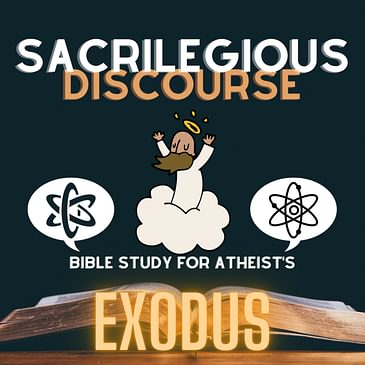Husband and Wife learn how little they retained of the Book of Exodus, even though it's supposedly the most important book of the Bible. They fail a quiz and fondly recall Aaron's special stick. Then they learn that HOLYthere were indeed all these other gods floating around back then. Wife bores Husband with details and he is a whiney .
Join Acast+ to enjoy our podcast adfree! https://plus.acast.com/s/sacrilegiousiscourse.
Join us on DISCORD: https://discord.gg/8RwwMrb5zK
Skip the ads by joining Acast+ https://plus.acast.com/s/6331d364470c7900137bb57d
Thank you for stopping by Sacrilegious Discourse - Bible Study for Atheists!
Check out these links for more information about our podcast and merchandise:
Our Homepage: https://sacrilegiousdiscourse.com/
Help support us by subscribing on Patreon: https://www.patreon.com/sacrilegiousdiscourse
The Book of Exodus is a story in the Hebrew Bible (or Old Testament) that tells the tale of the Israelites' escape from slavery in Egypt. According to the story, God intervened on behalf of the Israelites and forced the Egyptians to free them. The Israelites then traveled through the desert to Mount Sinai, where they received the Ten Commandments from God.
From an atheist perspective, there is no evidence to support the claims made in the Book of Exodus. There is no archaeological evidence of a large group of people suddenly leaving Egypt, and there is no scientific evidence to support the idea of God intervening in the natural world.
The Book of Exodus is likely a collection of myths and legends that were passed down orally for generations before being written down. It is possible that some of the events described in the book may have some basis in reality, but there is no way to know for sure.
The Book of Exodus is an important text in the Hebrew Bible and in Judaism, but it is important to remember that it is a work of fiction. There is no reason to believe that the events described in the book actually happened.
Here are some additional points that an atheist might make about the Book of Exodus:
- The story of the Israelites' escape from Egypt is similar to other ancient myths about people being enslaved and then escaping.
- The Ten Commandments are similar to other ancient ethical codes.
- The Book of Exodus contains many supernatural elements, such as the parting of the Red Sea and the giving of the Ten Commandments.
- There is no scientific evidence to support the supernatural elements in the Book of Exodus.
Ultimately, whether or not one believes the claims made in the Book of Exodus is a matter of faith. However, it is important to be aware of the lack of evidence for these claims and to critically evaluate the text before accepting it as historical truth.
Hosted on Acast. See acast.com/privacy for more information.






